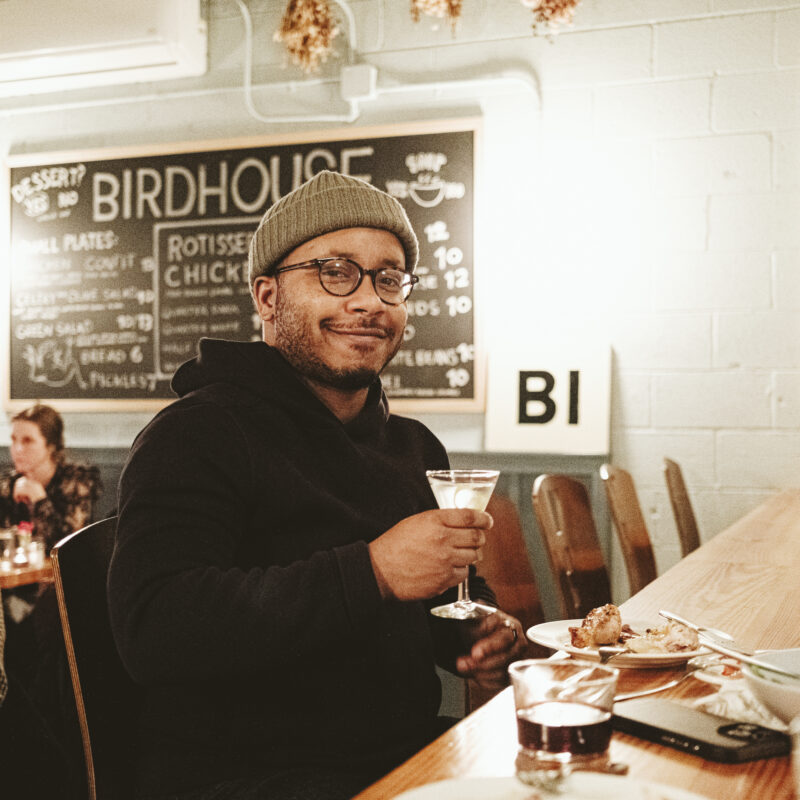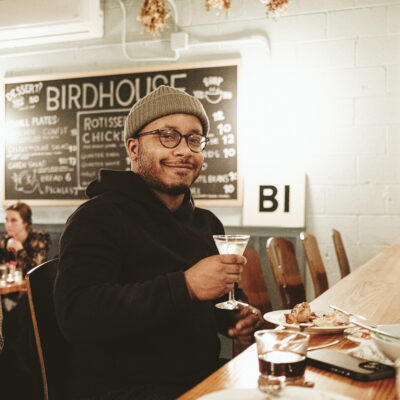Third Anniversary Celebration
Gravity Lounge
Wednesday, June 28 music
music
On a mid-summer night in 2003, The Gravity Lounge opened its doors for its very first concert. Paul Curreri, a local songwriter, demonstrated his guitar chops to a small audience sitting in patio chairs on a flagstone floor.
Back then, “We thought we’d serve coffee, sell books, and have a few local artists,” Bill Baldwin, the owner, says. The idea was to create a quiet space for music and contemplation—more of a “listening room” than a rock club.
Fast forward to a humid Wednesday night three years later: The flagstones are now covered in dark, jewel-toned Persian rugs. There are more, smaller chairs. The sliver disc tables glow with tealights, the chairs so close you can prop your feet on the stage.
This evening, the sizable space is almost full, from its blue neon reception area (spread with wide plates of spinach rolls, chilled asparagus and chicken satay) to the dimmer area near the stage. “There’s no resemblance [between] what we’re doing now and what we planned,” says Baldwin. “We’re almost completely an events-based music venue.” The unsold art books, balanced on elegantly industrial shelves, are kept around more for mood and sound dampening than reading.
As people continue to file in the door, it seems like each and every one of them stops to shake Baldwin’s hand and give a knowing nod, as if to say, “Yep, we can’t believe this place is still here, either.” Vocalist Richelle Claiborne drifts by in a black lace shawl, on her way to the stage, threading her way past such local musical luminaries as Jack Boylen, Robyn Wynn, Ezra Hamilton, Andy Waldeck and lovebirds Paul Curreri and Devon Sproule.
Fans hover over the handmade sweets —children at one large round table eat from a mounded central plate. But then the briefest of voice checks on the mic and a beckoning guitar strum draws the throng away from the asparagus, down a smooth stone ramp into the room beyond. Everyone stops talking at once, bodies drop into the waiting chairs, and the crowd begins to listen in rapt silence.
Andy Waldeck announces that his set will be all requests, and proceeds to deliver transfixing versions of Leonard Cohen’s “Hallelujah” and John Baptiste’s ”Sea of Love.” The Dirty Dishes served up delicious vocal harmonies, a la Edie Brickell. Vocalist Robyn Wynn, powered by rollicking guitar and harmonica, immediately has the crowd whooping back at her. Claiborne belts out her soulful originals, accompanied by the incomparable Ezra Hamilton on acoustic guitar (“There’d be no ‘Richelle Show’ if it weren’t for this place,” Claiborne says between songs. “This is the one place you know you can find me—behind the bar or up here.”) On almost every song, people are singing along and clapping.
To end the evening, local guitar hero Curreri takes the stage, followed a few songs later by his wife, Sproule. The highlight of their set is a gently harmonized version of Willie Nelson’s “Where You Want to Be,” which asks the musical question: “Take a good look and tell me what you see/Are you sure this is where you want to be?” The crowd’s quiet attention and unwavering gaze provide all the answer this evening needs.—Susan Rosen
The Virginia Quarterly Review
Summer 2006
words
Today’s VQR is all about variety. If you skip the contents pages and begin flipping through the journal, you never know what you’re going to arrive at next. Anyone who finds the disparities disconcerting is missing the point. Eclecticism is what keeps VQR’s vital signs stable and its energy level high.
The Summer 2006 issue begins with three pieces on the death of Slobodan MiloËsevi´c, and the current state of life after the disintegration of Yugoslavia, including one by American poet Charles Simic—a typical VQR move that ensures that the journal has a life apart from Time and Newsweek. A translation of a poem by Slovenian poet TomaËz ËSalamun follows, as well as new work by Hawaiian poet Garrett Hongo. Then, suddenly, it’s part two of the graphic novel Chicken With Plums by Marjane Satrapi. Then it’s off to Pakistan, courtesy of an essay and photographs by J. Malcolm Garcia. Next is a symposium on fiction writer Alice Munro, topped off by a new short story by the Canadian master. Then… Well, you get the idea.
Variety, like quantity, is sometimes at loggerheads with quality. It turns out that Simic’s little essay is more flat than stirring. While it’s nice to hear 10 people— including big names like Margaret Atwood and Russell Banks—ladling praise on Munro, after 10 pages (with still seven to go) the whole thing becomes rather cloying. And the insight isn’t always all that deep. Take Munro’s longtime literary agent Virginia Barber’s summation of her client’s style: “There is something about her writing that is so accessible. She doesn’t use drums and trumpets and purple prose. Quietly and surely she involves you in a story, and then there comes a paragraph or even a sentence that really knocks you sideways.” If you need proof that literary agents don’t have to have a Ph.D in English, there it is.
Of course, variety also breeds success. For some, the highlight of the issue might be UVA pundit and politics guru Larry Sabato’s idea for curing the American presidential election system. And for others, it might be Brock Clarke’s essay “The Novel Is Dead, Long Live The Novel,” which argues convincingly against Tom Wolfe’s pronouncement that post-9/11 America needs “big realistic novels.” And for others… Well, you get the idea.—Doug Nordfors





